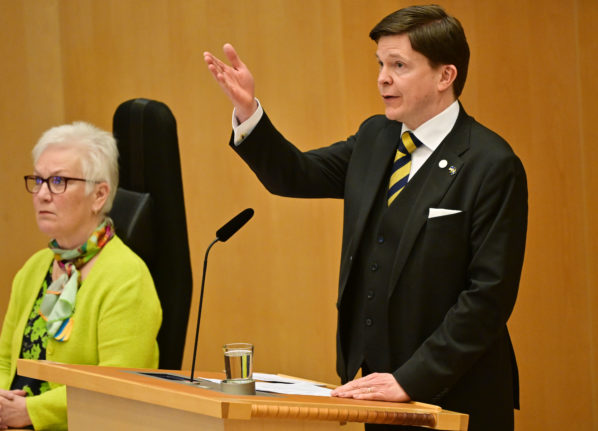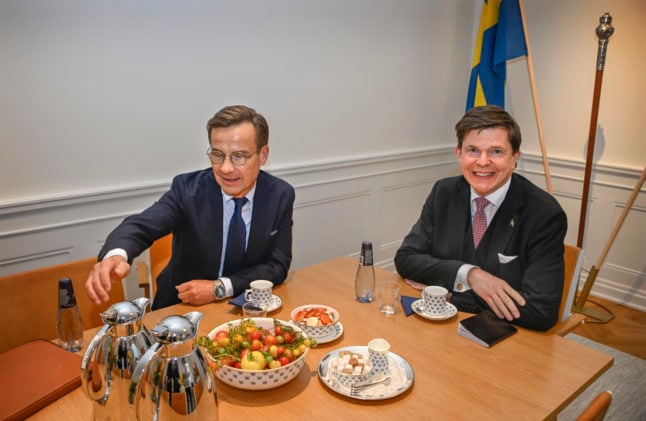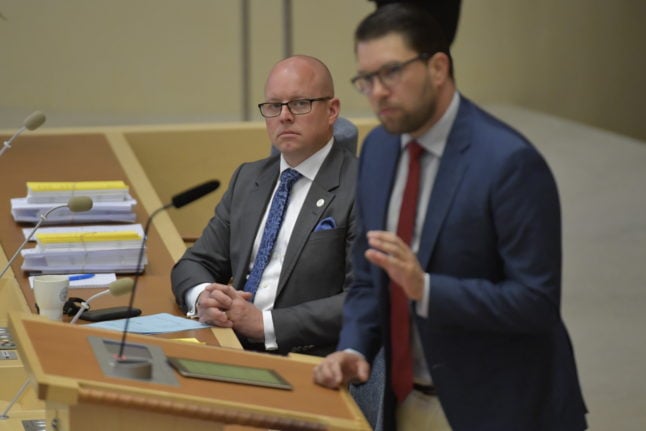On Monday, Sweden’s newly-elected parliament will elect a new speaker – talman in Swedish, but it’s still not clear who is likely to take over the post from Moderate Andreas Norlén, who has held the position since 2018.
How is a speaker candidate usually chosen?
There is no formal rule on how a speaker candidate is nominated, with the Social Democrats usually insisting the largest party supplies the speaker, and the Moderates arguing that the largest party in their bloc should provide the speaker.
Until now, that has meant that the Social Democrats believe the speaker should be a Social Democrat, and the Moderates believe the speaker should be a Moderate.
However, with the Sweden Democrats now the second-largest party in Sweden’s parliament, they have made claims on the speaker post, as they are now the largest party in their bloc, meaning under the Moderates’ rules, they should supply the speaker.
This has made the question of who should take over as the new speaker unusually charged.
Often – but not always, the speaker has been from the same party or bloc as the government. However, there are examples, such as in the case of Norlén, who has held the post despite there being a Social Democrat government for the last eight years, as there was a majority supporting him in parliament.
How is the speaker elected?
The first time parliament meets after an election, members of parliament (MPs) decide which MP will become the parliamentary speaker and which three MPs will become the deputy speakers. These four speakers are elected in separate ballots, first the speaker, then the first deputy speaker, the second deputy speaker and the third deputy speaker.
The candidates are nominated by parliamentary party groups, after which a secret ballot is held where each MP votes anonymously. To be successful, a speaker candidate must secure a majority of votes – 175.
If no candidate secures a majority, another vote is held, where a candidate must still gain 175 or more votes to win.
If no candidate is successful, a third vote is held, where the candidate with the most votes is elected – they do not need a majority.
If the third vote ends in a tie between two candidates, lots are drawn to determine which candidate is elected speaker.
A speaker is elected for an entire election period – they cannot be removed by parliament during this period, and the role can only change hands after a new parliamentary election, which usually means that a speaker sits for four years at a time.
What does the speaker do?
The speaker – aside from being the second-highest ranking official in the country after the King – holds a prestigious position.
They do not have political influence and, if elected, must resign from their role as a member of parliament. But they have an important role to play in building a government, nominating Sweden’s new prime minister after an election and dismissing the prime minister if they lose a no-confidence vote.
Although there are checks on these powers – a new prime minister must be approved by parliament before they take power – a speaker could, theoretically, nominate four prime ministerial candidates to parliament in succession, knowing that each would lose a parliamentary vote, and thereby trigger a general election.
Photo: Anders Wiklund/TT
The speaker could also theoretically refuse to nominate a prime ministerial candidate despite them being the leader of the largest bloc, although this has never happened in practice.
It is also impossible for parliament to remove a speaker once they are elected, unless a new parliamentary election is held and an entire new parliament is elected, meaning that if a speaker were to misuse their powers, it would be difficult for parliament to replace them.
The speaker is the main representative of parliament, leading and planning parliamentary activities. The speaker is chairman of meetings in the parliamentary chamber and is an official representative for Sweden at home and abroad.
Why would it be controversial if the Sweden Democrats supplied the speaker?
Electing a Sweden Democrat speaker would be a win for the far-right party, as a confirmation that the party has finally been accepted into the corridors of power.
According to a source at newspaper Aftonbladet, the four parties backing Moderate Party leader Ulf Kristersson to become Sweden’s next prime minister have already agreed on stricter migration and crime policies, as well as who should be voted in as speaker of the country’s parliament when the role goes up for a vote on Monday.
Multiple parties in the left-wing bloc have objected to a Sweden Democrat supplying the speaker, with outgoing Social Democrat Prime Minister Magdalena Andersson stating that her party is willing to collaborate with the Moderates and reelect Andreas Norlén as Sweden’s speaker instead in order to avoid a Sweden Democrat taking on the role.
Andersson said her party would be willing to “make an exception” to its principle. “We think there are arguments at this time, to have a speaker who can be appointed with very broad support in the parliament. What’s important is that it’s someone who can bring people together, either a Social Democrat or a Moderate”.
“I can state that Andreas Norlén enjoys great respect, both in the parliament, and among the Swedish people,” she said. “He has handled his duties creditably and during a turbulent time, and a problematic parliamentary situation.”
She said she was offering to discuss the issue with Kristersson to avoid the risk of a Sweden Democrat speaker, something she said would be “problematic”.
“This is a party whose whole rationale is to split rather than unite. This is also about the picture of Sweden overseas.”
Moderate Party leader Ulf Kristersson has not responded to Andersson’s comments.
There are also some MPs in the Liberal Party – who have agreed to support a Moderate-led government alongside the Sweden Democrats – who have stated they will not approve a government with Sweden Democrat ministers, and may also vote against letting them have the role of speaker.
Sweden Democrat Björn Söder, who held the role of deputy speaker between 2014-18, is a possible candidate for the far-right party. Söder is a controversial figure, having previously stated that Jewish people and Sami are “not Swedes”, leading to calls that he is not suitable for a role as a representative for all of Sweden.
Söder has also previously likened homosexuality to pedophilia and bestiality, stating in an article on the Sweden Democrats’ official online news site that “these sexual aversions are not normal and will never be normal”.
A public petition against electing Björn Söder as parliament’s new speaker had over 65,000 signatures as of September 23rd.






 Please whitelist us to continue reading.
Please whitelist us to continue reading.
Member comments